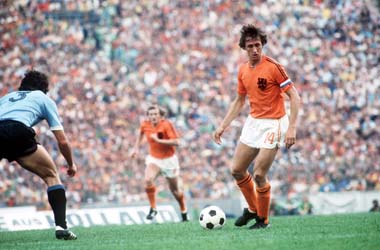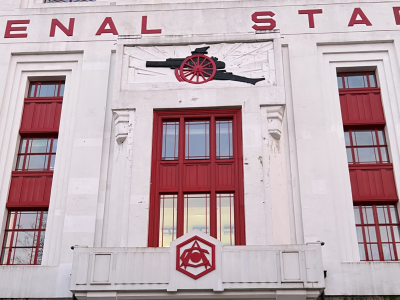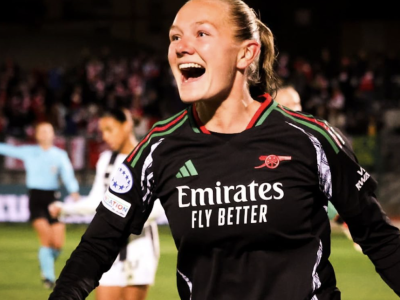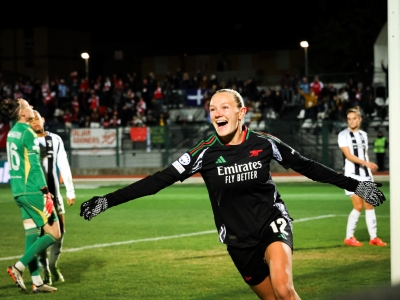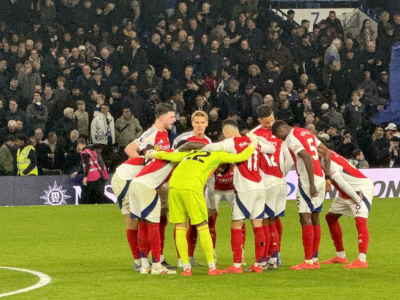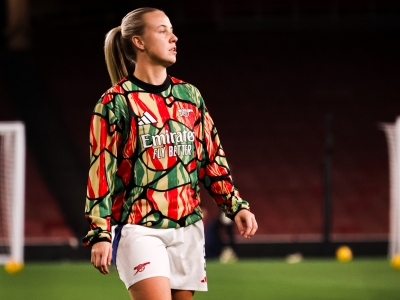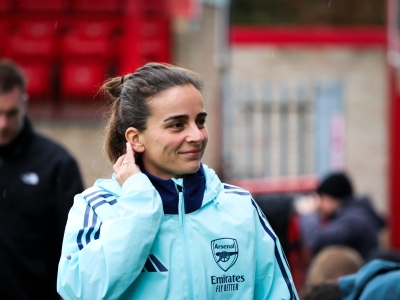A regular reader emailed me after hearing the news of Johan Cruyff’s death at the age of 68 yesterday and suggested “a piece about the great man would not go amiss”.
So even though Cruyff’s connections with Arsenal are limited to his appearances against them for Ajax in European competition, Barcelona in George Armstrong’s testimonial and a possibility that he might have signed for the Gunners in 1981, such is his standing in the game’s history that I feel it is worthwhile penning a short personal tribute. As much as anything it offers the opportunity for readers to post their own personal reflections and memories in the comments below.
My first real memories of Cruyff are from television. The first European Cup Final I watched was in 1972, when Ajax beat Inter Milan 2-0, having dismissed Bertie Mee’s Arsenal in the quarter finals. I was too young to really have any tactical perspective on the football I was watching in those days. Older readers can add those, although a youtube search on “arsenal ajax 1972” will offer you video of both legs of the tie with the Gunners. If you scroll down to ‘Ajax Full Games' and open that up, there is a full transmission of the second leg at Highbury. Given I have the next issue of The Gooner to get to press by the end of the Bank Holiday weekend, that will have to be a “watch later” job! Youtube, eh? It’s a bottomless pit.
I digress. But this is a personal tribute, so you are going to get a bit of me in it. Nothing wrong with that, as the one thing that Johan Cruyff symbolized was expressionism – on a football field, and with his opinions on the game. My next memory of Cruyff is Ajax winning the European Cup for the third year running in 1973, beating Juventus 1-0 in the final. That the side conquered Europe for three season running puts into perspective Arsenal’s achievement in defeating them in the 1970 Fairs Cup semi-final (Ajax had been beaten finalists in the European Cup final the season before).
The 1974 World Cup Finals are – for those old enough to remember it – the principle memory of Cruyff the footballer. Remember that televised football was generally restricted to highlights – and those would generally have been of domestic football or domestic sides facing European competition. Live matches were the occasional significant international, the FA Cup Final, the European Cup Final and occasionally the Cup Winners Cup Final if there was a domestic representative. So West Germany 74 offered us the chance to see seven full Holland matches with Cruyff at his pomp. And I may be wrong, but I am fairly certain this was the first occasion the now commonplace “Cruyff turn” was seen on UK television.
As Ajax played total football – players with good enough technical ability to swap positions at will depending on what was required during a game at any given moment – so did Holland. As an example, the opening goal in the final against West Germany began with Cruyff near the halfway line receiving possession – the deepest outfield player in the Dutch side. He then took the ball into the penalty area where he was brought down. Johan Neeskens converted to put the Dutch one up. The generally perceived view of the final is that, once ahead, Cruyff’s side got arrogant and toyed with the Germans, rather than going for the kill. They suffered for this approach when the Germans won a penalty of their own and eventually won the match 2-1. That Dutch side are sometimes regarded as the greatest side not to win a World Cup, although historians will argue for Hungary in 1954 and there is also a case for Brazil 1982.
Cruyff moved to Barcelona at the beginning of the 1973-74 season, and although they enjoyed his five seasons in Catalonia, he only won one league title and one Copa del Rey in his time there. Arsenal fans would have caught him in the flesh when Barcelona (along with former Ajax colleague Johan Neeskens) came to Highbury for George Armstrong’s testimonial, but there were no sightings of him on UK television. With his retiring from international football before the 1978 World Cup Finals, as a player, he largely disappeared off the radar as far as this youngster was concerned.
He finished his playing career with stints in the North American Soccer League and Levante in Spain, before returning to Holland to win titles with first Ajax, and then Feyernoord, along the way influencing the likes of young team-mates Marco van Basten and Ruud Gullit. Cruyff turned to management on retiring as a player. He was in charge at Ajax for three years, before moving to Barcelona in 1988. Gary Lineker was at the club at that time, and Cruyff returned to UK screens and my personal consciousness as he led his team to triumph in the 1989 European Cup Winners’ Cup final. Lineker was played as a right winger under Cruyff, and with English clubs being banned from European competition, we witnessed highlights of some of Barcelona’s European games, with Lineker as a focal point of interest. The image I have of Cruyff then is his chain smoking on the bench. Two years later, Manchester United defeated Cruyff’s team in the final of the same competition.
By the time of 1992 and Barcelona’s progress to the European Cup final (in the midst of a period when they won four consecutive La Liga titles), having been diagnosed with lung cancer, Cruyff was sucking lollipops on the bench instead of puffing fags. Few figures could get away with it, but he somehow carried it off. As for his team, it laid the foundations for the style of play that Barcelona have become synonymous with. Fast passing, often one touch, with intelligent use of space. It was exciting and highly watchable. Pep Guardiola was a cornerstone of Cruyff’s title winning sides, and his work years later as coach was heavily influenced by his time under the Dutchman. Significantly, Cruyff is also credited with the creation of La Masia, Barcelona’s infamous academy, set up at the suggestion of Cruyff back in 1979, when the player wanted to replicate the academy that had produced himself back in Ajax. The results speak for themselves, and Arsenal have benefited, not least from Cesc Fabregas’ decision to try his luck in England rather than remain in Catalonia as a teenager. Cruyff was sacked in 1996 after two trophyless seasons at the club, despite winning four league titles in a row between 1991 and 1994 and taking the club for four European finals in six seasons.
After Bruce Rioch was sacked by Arsenal in 1996, there was speculation that Cruyff might be his replacement, a prospect that excited myself and other Gooners greatly at the time. However, the board already had Rioch’s successor lined up, a certain Frenchman plying his trade in Japan. Cruyff was just paper talk. It would have been fascinating to see an Arsenal side with Dennis Bergkamp playing under Cruyff, although who knows whether the next 10 years would have seen as much success, whether Cruyff would have proved too much of a personality for the Arsenal board.
The links between Arsenal and Cruyff do have a glorious footnote. With the opening of the new stadium, Dennis Bergkamp’s testimonial took place, with many Dutch legends taking the field. It was a treat to see Marco van Basten on a football pitch again, but even that was trumped by the appearance of Cruyff himself, who had given the player his debut at Ajax 20 years previously. It was a magical day, and the last sighting of one of the world’s greatest ever players on an English football pitch – and there weren’t many.
Cruyff remained outspoken, telling it as he saw it, making enemies aplenty along the way, but also gaining a lot of respect for not playing the diplomatic game. There is no question he was a strong character with total conviction. And of course, he was the inventor of ‘that’ penalty – imitated by Pires and Henry (badly) and Messi and Suarez.
Anyway, to wrap it up, I’ll just say that in my lifetime, Cruyff was one of probably the greatest three players I had the pleasure to experience. The others are both Argentinian. I am too young to have any recollection of watching Pele. We are fortunate to be have been able to enjoy watching such genius on a football field. Dennis Bergkamp was not quite as great as Cruyff, but he certainly came close, and came from the same background and philosophy. And Bergkamp was the best footballer I have ever seen in an Arsenal shirt. No question.
To end, a taste of the man in terms of his personality and expression, from Dutch TV, stumbled upon by accident on youtube. We can only wonder what he might have brought to Arsenal given the opportunity.
Rest in peace Johan Cruyff. Legend. Great. We have enough footage to ensure his legacy will be remembered for a long time after his passing.

